 By Pepper Parr
By Pepper Parr
November 20th, 2016
BURLINGTON, ON
There is chatter about a larger city council.
It began with a column in the Hamilton Spectator by Joan Little and was followed by a piece written by Brian Heagle. Links to both are below
The significant seven we have now are not that interested in anything bigger. Mayor Goldring has pointed to Portland Oregon which has a seven member council which he thought was great.

Mayor Goldring’s 2015 Christmas card photograph.
Goldring doesn’t manage people all that well; his career path has not included any significant management roles. He prefers small groups of people that are like minded. Much of the thinking the city has seen the Mayor take up has come from a book he read and then invited the author to town for a speech.
There is going to have to be some form of leadership from the current Council and then a citizenship that rallies to that leadership and says it wants a different size Council.
The public is going to have to hear from past members of city council to talk about the deficiencies of a seven member council.
The people on city council now don’t get along all that well but they each have their alliances and know who they can go to for support. There are – it is not fair to call them cliques – but groupings that come together. Councillors Craven and Sharman are frequently joined at the hip and Lancaster will listen to almost everything Sharman whispers in her ear.
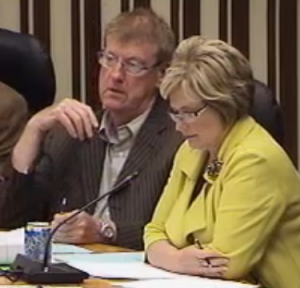
Councillors Sharman and Lancaster: both part of the Shape Burlington committee who seem to have forgotten what the report was all about – civic engagement
Taylor is wearying of the game and doesn’t want to be challenged by any upstarts who might have some new ideas. Dennison is comfortable with what exists now.
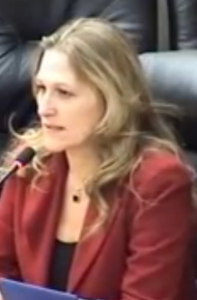
Does she still want to put her hat in the ring for job of Mayor in 2018?
Meed Ward used to be ‘gung ho’ on change; we haven’t seen that much of the Marianne Meed Ward who delegated ferociously before she was elected to council and was a thorn in the side of most during her first term – something the other council members needed. The fight seems to have gone out of her. To a considerable degree she is still ostracized. Her public comments on the seniors situation were disappointing.
Political organizations need new blood – that is part of why we hold elections.
Municipal politics is complex business. Its financial statements are not like those in the business world. A municipality cannot have a deficit – if they are short they have to dip into the reserve funds – there are more than fifty of those with millions of dollars sitting in bank accounts.
The Finance department to its credit does a good job of getting the city a good return on the investments it makes – given that there are a lot of things the city is now allowed to invest in.
For a newcomer to get elected to council the learning curve is very very steep. It takes a full term to get a feel and understanding for the way the city works and how staff relate to council.
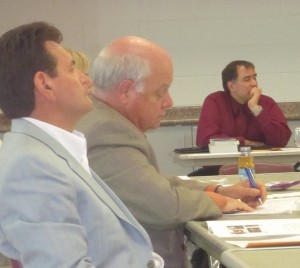
Councillors Craven and Taylor live on opposite sides of the political spectrum. Each has their strengths – along with a considerable amount of time on city council.
For those new to municipal politics having to learn how city hall works and how the Regional Council works is more than most can manage.
It makes a lot of sense to have two levels of Councillors; one who is just a ward Councillor and the other who is both a ward councillor and a Regional councillor.
The comments we are seeing about what these ward only level councillors should be paid is insulting. Those who do the job work hard; the issues they have to deal with are not simple. To pay someone $30,000 to serve as a ward only councillor is going to get you someone stupid enough to accept such a pittance.
If you are not prepared to pay well – you are going to get very little in the way of talent. That $115,000 – give or take a bit – we pay our city council members now is money well spent. They make mistakes and they could tone up their attitude when dealing with the public – especially with delegations to council meetings. But they are fairly paid.
The view that they were elected to run the city and the public gets to decide if they like what they got only at election time is an idea that went out of style in the late fifties. This lot trots out the words accountability and transparency without understanding or believing what they really mean.
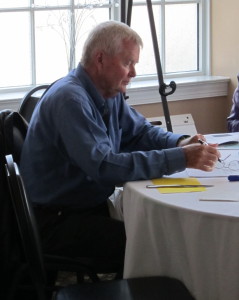
Dennison has the best understanding of the dollars and cents side of civic administration.
It is up to you the public to hold them accountable every chance you get. They are no better than you are. When that OPP cruiser slides by you on the 403 your foot comes off that gas pedal – that is you being accountability to that police officer. It’s the way the world works.
If the current council chafes at that it is because you have let them get away with far too much.
Just don’t insult the institution of public service by not paying them adequately and fairly and providing them with the staff support they need.
A trained administrative assistant could serve two Councillors in the same ward – it wouldn’t be a bad idea to recruit those people from outside existing city hall staff.
If there are people out there who want to run for public office they have to have started their campaigns by now. The rules have changed giving the incumbents an even better chance of winning.
How good it is for the incumbents?
Marcus Gee, a Globe and Mail writer who focuses on municiapl politics wrote on the weekend asking:
Imagine a high-school student council whose members never graduate but stay on year after year, growing older and crankier as the student body they govern evolves. It shouldn’t be much of a strain for residents of Toronto to picture. That’s what their own city council is like.
Councillors hang around year after year – sometimes decade after decade – aging in place as the dynamic city they govern changes all around them. The same old characters have the same old quarrels over and over in a repeating loop of futility.
Like any group or organization that doesn’t renew itself, they have become inward-looking, inbred, ingrown. Voters tune them out. Cynicism about politics grows.
How do we break out of this trap? A small group of reformers has an idea.
The Open Democracy Project announced it was putting together a DemocracyKit, “a crowd-sourced, crowd-funded resource to equip the next generation of city-builders.” The plan is to give newcomers the tools they need to break into the restricted club of city politics.
The democracy kit would include such things as fundraising plans, a guide to door-to-door canvassing, website templates and contact-management systems.
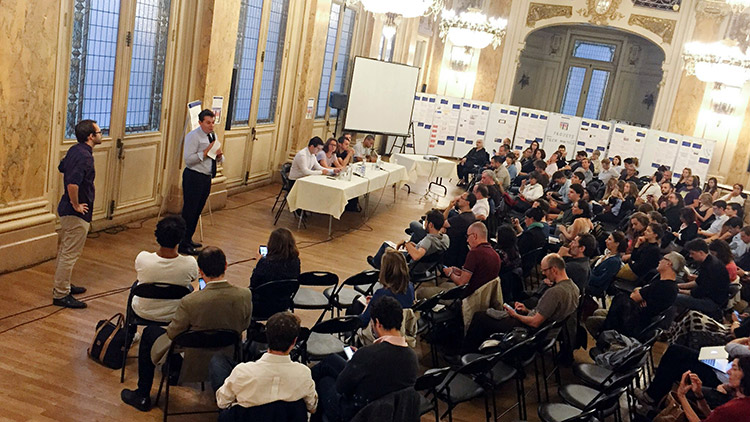
Democracy at work – people planning on what they want to see done.
It’s all aimed at counteracting the power of incumbency. Sitting politicians have overwhelming advantages. They have name recognition, especially critical at the municipal level, where most voters aren’t paying much attention. They have access to the big-name spin doctors and campaign managers who dominate the election game. They have a web of contacts in unions, community groups and local business associations that help them get re-elected. They know the ropes.
No wonder that so many manage to stay on and on. The Open Democracy Project says that incumbents won 92 per cent of the time in elections held in three cities – Toronto, Calgary and Ottawa – since 2001.
Burlington has Councillors who have warmed their chairs in the council chamber for more than twenty years.
Related articles:
Brian Heagle with his view point.



















When it comes to organizational design and effectiveness, I don’t think we can ask the people who will take a drastic cut in wages and scope of work to be objective. The answer to the question, how big should Burlington council be, is probably best answered by conducting an organization effectiveness audit that looks at Mission and Purpose, Strategy, Talent, Tools, Conditions and most importantly the Results we expect from our alderman. In terms of sheer numbers, Burlington appears to be on the lean side with 6 aldermen, whereas Oakville, St Catherine and Guelph who have a similar or smaller population base all have 12. Both Kitchener and Windsor with populations over 200,00 have 10. Just saying we need more is not the place to start.
I don’t think the size of Council is the issue. Like others have said, it’s the lack of a term limit that is the problem. I have nothing but respect for our Councillors, and as much as I complain like everyone else about the job they’re doing, I know it’s not an easy job. It’s a thankless and very demanding job where often times they must take a position where there is no clear right or wrong. This job takes them away from their families at times when the rest of us are going home to ours, and opens them up to unrelenting scrutiny and naysayers. Yes it’s a life they’ve chosen, but it’s not easy. It no doubt takes a toll, and because of that we often see career politicians who find themselves somewhat separating from reality, living a parallel life that isn’t quite the same as the reality their constituents face. They start focusing more on their legacy than the here and now, choosing to say what will get them re-elected over things that may be controversial at the time, but need to be said for the good of the City. Naturally, like you and I, they want to keep their jobs. By implementing a 2 term limit, that would give them their first term to learn how things work, and if re-elected, a second term to take action without being distracted by the desire to be re-elected. If you have a good mix of first and second term Councillors, the whole dynamic would change, as would the urgency to get things done. Having fresh and qualified business people in those seats before their minds switch over to career politician mode would be beneficial in so many ways, not only to us the citizens, but also to the Councillors themselves. In my humble opinion.
I agree with many of the conclusions that you have reached regarding term limits although I would like to see more councillors to spread the workload and hopefully create a wider range of debate within council. I also don’t disagree about the workload–it’s a difficult job but as you note, one that they have chosen.
However, I don’t respect the mayor and members of the council as a whole.Increasingly this group has focused more on special interests, consultants, and lobby groups while marginalizing taxpayers/residents–it pursues its own agenda. We have just witnessed in the USA what happens when a government is seen as being out of touch; in 2018 it will be our turn to “drain the swamp”.
I would agree with those saying size is fine including former mayor Walter Mulkewich. If it is made larger then one would assume as responsibilities are less pay will be less per Councillor. I do think there should be a limit to 2 terms as it should not be a career position. No limit almost guarantees re-election as turn out is so low and name recognition so important. P.S. You wonder why so few in Burlington read Joan Little and I believe having read her religiously she, like a number of Councillors is irrelevant and her like them has a best before date long since past.
Good article Pepper!
A larger Council with a differentiation between Regional and Local Councillors, as exists in Oakville, would, I think, do a lot to promote better engagement. What would also help in counteracting the power of incumbency would be term limits. Two terms and then you should either run for something else, or leave. Anyone who has been in a position for twenty years has become stale and hide-bound.
The other impediments that deter many potentially good candidates from running are the number of hours, the endless and often long and unproductive meetings, and the highly bureaucratic and inefficient structure of local government. When you consider the amount of time involved the salary isn’t that substantial or enticing.
The other issue is that the very structure of local government is archaic. You have far too many people at City Hall who have never seen anything else, or done anything else, other than work in the public sector. For too many it has become a sinecure. We need public servants who have the capacity to adapt and grow, and unfortunately, the corporate culture at City Hall doesn’t promote that type of behaviour.
I’ll second that, Stephen—congrats on writing an excellent article, Pepper! I think you analyzed very well what is becoming a closed little club at City Hall.
And Stephen’s observation about the need for better engagement is spot on; increasingly we are seeing in several actions by the City, a Mayor and Council that is out-of-touch with the residents and what is worse, in a few instances, is that some of this group know it and don’t give a damn what residents think. We have seen several instances where insiders/lobby groups and special interests have far too much clout in decisions that have negatively impacted residents. Your conclusion that term limits is certainly well-taken; a fresh set of ideas and approaches to problem-solving would be a welcome change. While no huge fan of Donald Trump, his call to “drain the swamp” could easily apply to City Hall.
“Does Burlington need a larger city council? Have some of the current members served long enough?” ….. NO and NO
Over the last few years I have had the opportunity to engage every member of council and the mayor on issues of concern.
Each of them have their own way of responding however, their time on council was not a factor when dealing with a question or obtaining information.
Whoever decides to run for office, incumbents or not, will need the votes of the residents to be successful, that’s democracy.
“The view that they were elected to run the city and the public gets to decide if they like what they got only at election time is an idea that went out of style in the late fifties.”
I agree with the author on that.
Over the last few month’s the most surprizing source has told us several time that we can vote them out if they don’t thing their decisions are good. That councilor should be careful what they wish for.
“Public service” is a misnomer, when obviously there are council members who have made an excessively long career out of “serving”. Real “Public Service” is what Volunteers provide, for free, with only intrinsic rewards from the satisfaction of contributing to our society’s success (i.e., no extrinsic compensation). So let’s quit kidding ourselves and call it what it is: a job (for which the only required qualification is winning a popularity contest).
With respect to what members of council should be paid, it is a simple matter to engage compensation experts like Hay or Mercer, or an expert member from McMaster’s Faculty of Business, to do a professional job analysis to evaluate the job based on objective criteria and provide an appropriate amount, free of influence from potential beneficiaries.
With respect to the “incumbent advantage” issue, the simplest solution is to limit councilors to a maximum of two or three consecutive terms. If it’s suitable for the President of the U.S., why not for councilors?
The City does not need MORE Councillors, it needs fewer Career Councillors. Two terms is plenty, that’s why it’s stagnant.
The City is a Corporation and the Board of Director does not need to get bigger.
More ,new, young people need to run and the old guard needs to make way.
I could not agree more. The current Council represents a sterling case for term limits not necessarily an increase in numbers. Indeed, I strongly suspect that one member of Council is so bored after many years at City Hall that he has taken to commenting regularly and at length n the Gazette. Perhaps Pepper could provide him with a column after October 2018.